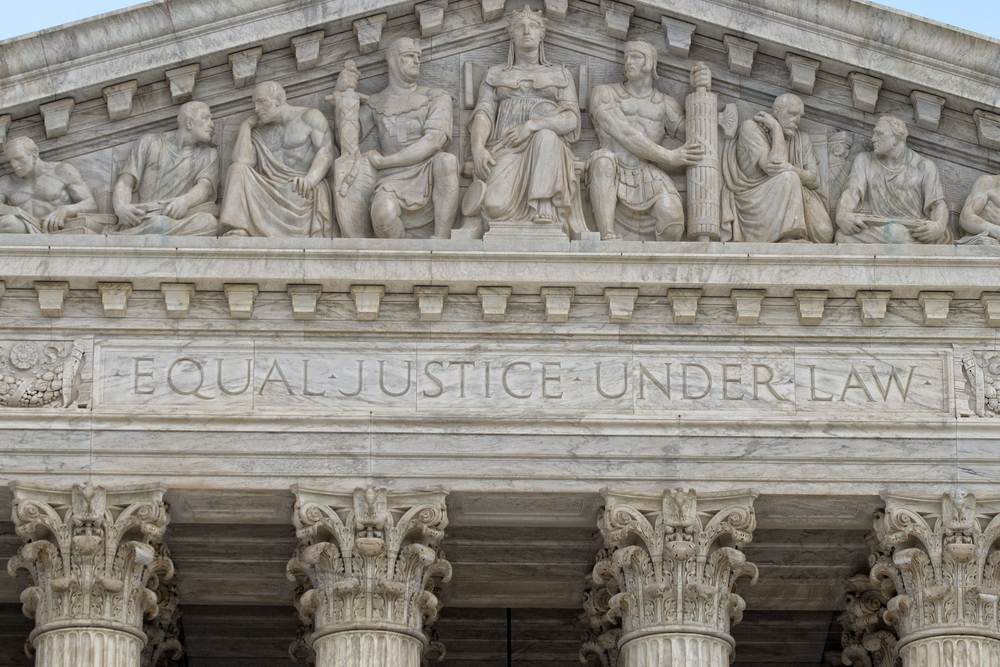Now that Justice Breyer has announced his retirement, President Biden has decided to fulfill his promise to nominate an African American woman for the Supreme Court of the U.S. (a.k.a. SCOTUS). Many Republicans and conservatives have criticized his decision, offering one or more of the following reasons. For example, libertarian scholar Ilya Shapiro contends that the president is not committed to nominating the “objectively best person” for the job but rather a less qualified African American woman. Others criticize the president’s decision by focusing on a poll indicating that about 76% of Americans wish the president considers “all possible nominees,” and only 23% prefer that he follows through on his promise. Still, others, be they liberal or conservative, might claim that by committing himself to nominating an African American woman, he is discriminating against better qualified candidates.
I will argue that President Biden has not only the right to nominate an African American woman for SCOTUS, but, if he chooses a suitable candidate, he will be doing a great service to our country. The appointment of an African American woman to SCOTUS will offer a neglected but important perspective to help our nation grapple with present and forthcoming challenging decisions. Since Supreme Court Justices address highly controversial and politically sensitive issues that affect everyone, I maintain that a suitable candidate must possess, above all, moral integrity and good judgment for doing the job right.
Unlike our elected officials whose moral integrity, while desirable, is not necessary for performing well in office, we expect Supreme Court Justices to transcend their personal biases and prejudices in rendering impartial and fair decisions. Regrettably, oftentimes they fail to do so. Despite these failures, the justices abhor being perceived as politicians because presumably they do not aim at promoting policy outcomes to benefit most citizens or the interests of some. Instead, they justify their decisions by recognizing people’s political rights as found in the letter and/or the spirit of the constitutional text.
How can the president, his advisers and the Senate ascertain whether a nominee possesses moral integrity and good judgment? If the nominee be a judge, which in fact she need not be, those doing the vetting can look into her past judicial record. Also, they might go about querying those who have known the nominee in her different social roles to ascertain her moral character. Given the polarized nature of the Senate, lawmakers – especially Republicans – will try to find fault with a candidate’s moral standing, question her judicial decisions, and scrutinize her judicial philosophy. Despite its shortcomings, I can think of no better approach because, like our adversarial legal system, more often than not it works. For some, such a partisan and inquisitorial approach might not live up to their ideal for selecting “the objectively best candidate,” but we are not living in an ideal republic. We are living in an imperfect, but still perfectible democracy.
Some insist on what they conceive of as “the objectively best Supreme Court candidate.” Their conception, however, is just a sham. There are only better or worse candidates. In what sense could we claim that a person is a better candidate than another? In the sense of someone having a superior educational pedigree, for example, by having graduated summa cum laude from a prestigious law school. Or she might have clerked for a reputable judge. Or she is a prolific legal scholar. Or she possesses an envious intellectual IQ. But “better” could also mean having an exceptional emotional intelligence evidenced by exercising good judgment in her legal decisions and/or in her legal scholarship. Or she might have shown exemplary moral integrity in her different roles in society. Or she has demonstrated commitment to living up to the ideals expressed not only in the Constitution but also in the Declaration of Independence to make this a better world for all.
Of course, some might argue that the above is a false dilemma. The president could nominate a person who meets all of the already-mentioned conditions: better credentials, exceptional moral judgment, and integrity. Perhaps, but our moral judgments and integrity are conditioned, in part, by who we are and by our lived experiences. And the unique voice of African American women has been conspicuously absent from SCOTUS.
Suppose that we need to select between two candidates for SCOTUS. One has an extraordinary intellectual IQ with an exceptional educational pedigree. However, one candidate has shown substantive moral failures, such as having engaged in ubiquitous plagiarism while in law school, or having expressed racist, misogynist, or xenophobic views, or having supported special interest groups at the expense of the greater good. The other candidate has an average intellectual IQ with a solid, but not necessarily extraordinary educational pedigree. Yet she is known for having impeccable moral integrity and good judgment in her public and private life. Whom should we choose for SCOTUS? I would choose the latter because extraordinary intellectual virtues do not guarantee having moral integrity and sound moral judgment.
Next, I argue that those who prefer that the president listens to how most Americans feel about considering “all possible nominees” rather than an African American woman are not offering a compelling argument. First, they could be mistaken about their beliefs, or they might be biased against selecting an African American woman. The president’s advisers and members of the Senate are in a better position to determine who the suitable candidate would be for the greater good of the nation. Since the president has the right to nominate any candidate for SCOTUS that he thinks would be best for all, he can reasonably use race and gender, among other criteria, to narrow the pool of suitable candidates. He can justifiably do so by offering the following two reasons. He might argue that by selecting an African American woman for SCOTUS he is remedying past wrongdoings, and that by having a diverse composition of SCOTUS that mirrors our cultural milieu he is promoting the greater good of an inclusive society.
To those who argue that, by having made such a promise, the president is politicizing and discriminating against other better qualified candidates, I will offer the following two responses. First, nominating a Supreme Court candidate has always been political. And second, in approving any nominee, one would be discriminating against other potential nominees who were not considered or selected. Discrimination is unavoidable. The issue is whether such a discrimination is justified for our greater good. Part of the greater good is to try to correct past injustices against members of excluded groups, such as African American women, who have been substantively harmed. The president and members of the Senate have not only the legal right to try to overcome past wrongs against any unfairly treated groups but, more importantly, they have the moral duty to do so.
Lastly, one would be ill-informed to suggest that there is an insufficiently large pool of African American women from which to choose a suitable candidate for SCOTUS. I have reason to believe that such a pool exists. Also, I am sure that there are other potentially well deserving nominees who could represent the rich and diverse cultural experience of our nation, such as Native or Asian Americans, Latinx, or members of the LGTBQ+ community, to mention only a few.
An African American woman will bring a unique experience to SCOTUS to address many of our pressing legal and political issues for generations to come. To those who are skeptical about considering race or gender for membership in SCOTUS I can only say that, given our racist and misogynistic history, race and gender have mattered for the wrong reasons in the past. I can only hope that both might matter for the right reasons nowadays: to bring an important and neglected voice to SCOTUS for the benefit of all. Even if we were to accept that our Constitution is race- and gender-blind, those who have the power to interpret it are not.


